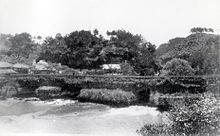| Yoshiya Chiruu | |
|---|---|
| Born | 1650 Yomitan, Okinawa |
| Died | 1668 Naha, Okinawa |
| Nationality | Ryukyu Kingdom |
| Occupation | hostess |
| Known for | Ryuka poet |
Yoshiya Chiruu (吉屋ちるー) was a Ryuka poet (1650?–1668?) who was born to a poor peasant in the village of Yomitan in the Ryukyu Kingdom. She worked in Yoshiya, an Akasen or red-light district house, in the 17th century. She charmed many pechin by her literary ability and beautiful looks. A legend tells that she fell in love with the Aji of Nakazatu, but she committed suicide via starvation on hearing her freedom was bought by a rich man called Kurogumo, at age 18.
Historicity
No contemporary source mentions Yoshiya, probably for her humble status. Some ryuka traditionally attributed to her are probably not her own. She is a protagonist of Koke no shita (苔の下), written in Classical Japanese, by the pro-Japanese Ryukyuan official Heshikiya Chōbin (circa 1730), where she is referred to as Yoshiya-kimi (よしや君) and is said to have been born in 1650 and died in 1668. Fuku Hiromi noted that Yoshiya means "what will be will be" in Japanese poetry, which Heshikiya was familiar with.
Kadekaru Chizuko pointed out that earlier sources did not identify the composer of poems attributed to Yoshiya today. Hokama Shuzen observed that her poems reflected waka-style artifice and thus were composed some time around the early 18th century.
Her Ryuka

At age 8, she had to cross the Hija Bridge between Kadena and Yomitan to be sold to a house.
|
Ryukyuan language
|
Pronunciation
|
Translation
|
References
- ^ Fuku Hiromi 福寛美 (2010). Ryūkyū no koiuta 琉球の恋歌 (in Japanese).
- Kadekaru Chizuko 嘉手苅千鶴子 (2003). Omoro to ryūka no sekai おもろと琉歌の世界 (in Japanese).
- Okinawa Daihyakka Jiten Kankō Jimukyoku (1983). Okinawa Daihyakka Jiten 「沖縄大百科事典」 [Okinawa Encyclopedia]. Naha: Okinawa Times. p. 805.
- Nihon Shodō Bijutsukan (1992). Ryūka: Nantō no Uta no Kokoro 「琉歌:南島のうたの心」 [Ryūka: the Heart of the Songs of the Southern Islands]. Tōkyō: Kyōiku Shodō Shuppan Kyōkai.